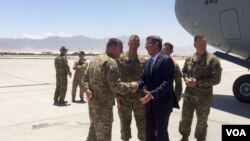Afghan President Ashraf Ghani and U.S. Secretary of Defense Ash Carter Tuesday painted a rosy picture of the progress made in Afghanistan. But they nonetheless faced pointed questions on issues from rampant Afghan corruption to Pakistan’s role in the Taliban conflict.
When asked about Afghanistan’s stalled anticorruption reforms, President Ghani called it the country’s “greatest transition” away from an “entrenched system.”
"Corruption is as dangerous as terrorism," Ghani said, adding that his government is working to end impunity through the formation of the Counter Corruption Center in the upcoming months.
Carter assured that progress by the Afghanistan government on economic and anti-corruption reforms is central to continued international support. He added that Ghani and Afghan Chief Executive Abdullah Abdullah, whom Carter also met in Kabul Tuesday, have kept the unity government together and earned the admiration of the U.S. and international allies.
Ghani said that, in addition to taking the lead in security for the country, Afghans have simultaneously struggled against an “economic recession bordering on depression” since NATO troops, the economy’s biggest spender, left the country in 2015. But he said Afghans managed to increased revenue by 22 percent despite the obstacles.
“Any other country .... that faced that transition would have now been on its knees,” Ghani told a reporter. “We’re standing tall.”
Pakistan
Carter and Ghani also discussed neighboring Pakistan, which Afghanistan has long accused of supporting Taliban fighters.
Carter said the U.S. and Pakistan have shared a strong, longstanding relationship.
“We believe that the greatest threat to Pakistan’s security is terrorism, and therefore, we work with Pakistan wherever we can,” he said.
But Islamabad has criticized Washington for a drone strike earlier this year, which Pakistani leaders say violated the nation’s sovereignty. Taliban chief Mullah Akhtar Mansour was killed in that strike, leaving Pakistan looking guilty of either incompetence or complicity, or turning a blind eye on the U.S. enemy.
Carter vowed the U.S. will continue to strike terrorist leaders “everywhere in the world where they might threaten Americans or our interests and our friends.”
"There is no difference between good terrorists and bad terrorists," Ghani added, in what appeared to be a caution to those in the region who might support the Afghan Taliban while fighting the Pakistani Taliban.




